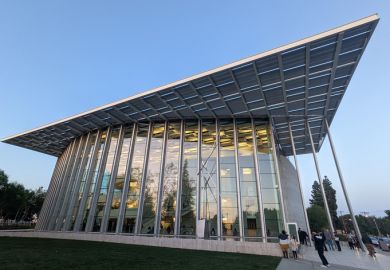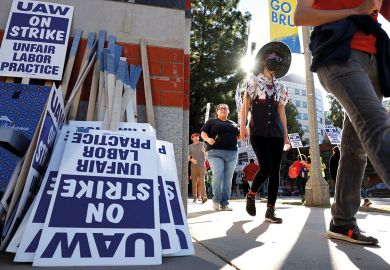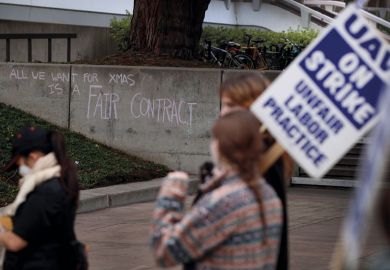Faculty at California State University, the nation’s largest public university system, plan to walk off the job this week to raise pressure for their demand for a 12 per cent pay increase.
The scheduled week-long strike will involve the 29,000 CSU professors, lecturers, librarians and coaches at all 23 campuses, their union said. The 460,000-student system plans to keep its classes running during the action.
The workers’ union, the California Faculty Association, has asked for a three-year contract that begins with a 12 per cent pay increase. It overwhelmingly approved plans for the strike earlier this month after CSU administrators ended eight months of negotiations, saying that the 12 per cent request was unaffordable and that they would instead give the workers a 5 per cent rise starting this month.
The union said the 12 per cent increase would put pay for its lowest-paid faculty members at $64,360 (£50,630) per year. “CSU management wants to maintain the status quo, which is not working for the vast majority of our faculty, students and staff,” the union said.
CSU leadership complained that the union has not modified its 12 per cent demand at all during the entire negotiating process, and said that the 5 per cent rise “is consistent with agreements the CSU has already reached with five of its labour unions”.
CSU is so big that it accounts for one of every 20 Americans holding a college degree. The walkout comes just a year after a 32-day strike at its statewide companion, the University of California system, involving nearly 50,000 teaching assistants and other unionised academic workers that was the biggest-ever job action in US higher education.
Higher education and many other sectors of the US economy have seen elevated levels of labour unrest since the pandemic, owing to factors widely seen as including workers wanting to keep greater flexibility in their job conditions while getting the financial security of Covid-related government aid.
Most contract disputes at US colleges and universities, however, have been settled short of strikes. Just last week, the 10-campus Pennsylvania State System of Higher Education reached the outline of an agreement with its faculty union on a new four-year labour contract.
California State University system leaders have described themselves as being caught in an especially tight financial bind. The system recently announced that it would raise tuition fees by 6 per cent annually through the 2028-29 academic year to help reduce a $1.5 billion (£1.2 billion) budget deficit.
CSU and the union worked through a neutral third-party process, established by the state’s Public Employment Relations Board, that concluded that a 12 per cent salary increase would be unsustainable for the CSU system, and instead recommended a 7 per cent rise. CSU leaders largely welcomed the report, while the union said that the 7 per cent level would amount to a pay cut for faculty and suggested that CSU reduce its administrative costs.
The union has argued that CSU’s budget expanded by 68 per cent from 2014 to 2022, with the number of administrators climbing by 34 per cent, both well above the system’s 13 per cent growth in enrolment and the nation’s 24 per cent rise in inflation.
“The contract we are fighting for is not something we merely want. It is something we fundamentally need,” said Kevin Wehr, a professor of sociology at CSU-Sacramento who has chaired the union’s bargaining team.
Last month, the CSU faculty union organised a series of one-day protest strikes across several CSU campuses.
In addition to its salary demands, the union has asked CSU for manageable workloads, more mental health counsellors for students, expanded paid parental leave, breastfeeding facilities and gender-inclusive toilets.
Register to continue
Why register?
- Registration is free and only takes a moment
- Once registered, you can read 3 articles a month
- Sign up for our newsletter
Subscribe
Or subscribe for unlimited access to:
- Unlimited access to news, views, insights & reviews
- Digital editions
- Digital access to THE’s university and college rankings analysis
Already registered or a current subscriber?








